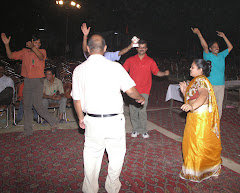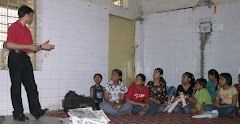 Social Action for Advocacy and Research (SAFAR) is consistently working for caste and gender sensitization through various awareness programs and advocacy campaigns. While doing so we use various media forms and techniques as campaign tools. Posters, pamphlets, stickers, wall magazines, calendars and films are some of the forms we use and experiment with. We see these media forms not merely as mediums of expression and art forms, but also effective tools to sensitize/mobilize/aware common mass on any particular issue.
Social Action for Advocacy and Research (SAFAR) is consistently working for caste and gender sensitization through various awareness programs and advocacy campaigns. While doing so we use various media forms and techniques as campaign tools. Posters, pamphlets, stickers, wall magazines, calendars and films are some of the forms we use and experiment with. We see these media forms not merely as mediums of expression and art forms, but also effective tools to sensitize/mobilize/aware common mass on any particular issue.Keeping this into mind SAFAR has initiated a unique program called SAFAR Film Series last year. The main idea behind this program is to undertake issue based mobile film screenings series. Under this program we periodically organize a series of screenings of any particular film for two-three days at as many places as possible in a city. We ultimately aim to approach and sensitize those who generally do not get chance to acquaintance with the people/culture/tradition/idea/trend which affects the very social fabric of this country and therefore remain confused or mere play a role of mute spectator. The post screening discussion is equally important for us, and therefore we try to make the concerned film maker/director available for a fruitful discussion.
SAFAR is going to organize a series of screenings of INDIA UNTOUCHED under the SAFAR FILM SERIES on 25-26 February at various places in Delhi. Stalin K., the director of the film has kindly consented to be available for the discussion. Details of screening schedule and a brief note about the film and the director are as follows:
Screening Schedule
25 February 2009
12.00 am: Kamla Nehru College, Delhi
3.30 pm: Delhi School of Social Work, Mall Road, Delhi
26 February 2009
11.00 am: Dr. Bhim Rao Ambedkar College, Yamuna Vihar, Delhi
2.30 pm: Aditi Mahavidyalaya, Auchandi Road, Bawana, Delhi
(Besides above mentioned screenings there will be some more screenings, but venues will be announced later.)
108 minutes. Hindi, Bhojpuri, Gujarati, Punjabi, Tamil, Telugu, Malayalm with English sub-titles
Directed by Stalin K.
"INDIA UNTOUCHED-Stories of a People Apart" is perhaps the most comprehensive look at Untouchability ever undertaken on film. Director Stalin K. spent four years traveling the length
 and breadth of the country to expose the continued oppression of 'Dalits,' the 'broken people' who suffer under a 4000 year-old religious system.
and breadth of the country to expose the continued oppression of 'Dalits,' the 'broken people' who suffer under a 4000 year-old religious system.The film introduces leading Benares scholars who interpret Hindu scriptures to mean that Dalits 'have no right' to education, and Rajput farmers who proudly proclaim that no Dalit may sit in their presence, and that the police must seek their permission before pursuing cases of atrocities.
The film captures many 'firsts-on-film,' such as Dalits being forced to dismount from their cycles and remove their shoes when in the upper caste part of the village. It exposes the continuation of caste practices and Untouchability in Sikhism, Christianity and Islam, and even amongst the communists in Kerala. Dalits themselves are not let off the hook: within Dalits, sub-castes practice Untouchability on the 'lower' sub-castes, and a Harijan boy refuses to drink water from a Valmiki boy.
The viewer hears that Untouchability is an urban phenomenon as well, inflicted upon a leading medical surgeon and in such hallowed institutions as JNU, where a Brahmin boy builds a partition so as not to look upon his Dalit roommate in the early morning.
A section on how newspaper matrimonial columns are divided according to caste presents urban Indians with an uncomfortable truth: marriage is the leading perpetuator of caste in India.
But the film highlights signs of hope, too: the powerful tradition of Dalit drumming is used to call people to the struggle, and a young Dalit girl holds her head high after pulling water from her village well for the first time in her life.
Spanning eight states and four religions, this film will make it impossible for anyone to deny that Untouchability continues to be practiced in India.
Director: Stalin K.
Stalin K. is a human rights activist and award-winning documentary filmmaker. In recent years, he has become known for his pioneering 'participatory media' work with urban and rural communities, in which local people produce their own videos and radio programs as an empowerment tool. He is the Co-Founder of DRISHTI- Media, Arts and Human Rights, Convener of the Community Radio Forum-India, and the India Director of Video Volunteers. He is a renowned public speaker and has lectured or taught at over 20 institutions ranging from the National Institute of Design and the Tata Institute of Social Sciences in India, to New York University and Stanford and Berkeley in the US.
'INDIA UNTOUCHED is Stalin's second film on the issue of caste—his earlier film 'Lesser Humans,' on manual scavenging, won the Silver Conch at the Mumbai International Film Festival and the Excellence Award at Earth Vision Film Festival, Tokyo, and helped to bring international attention to the issue of caste.






































